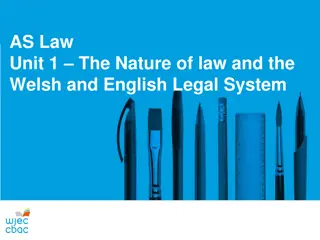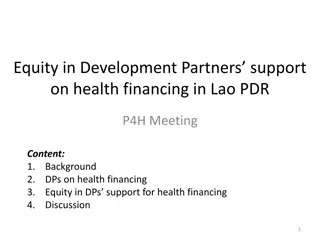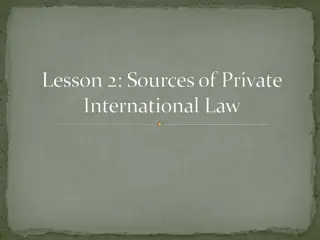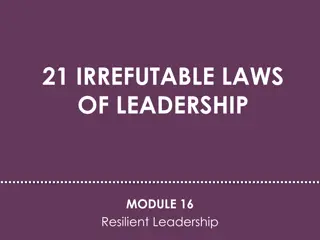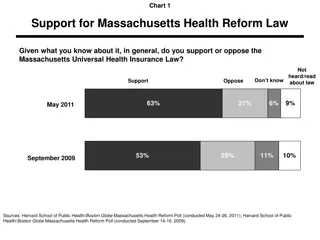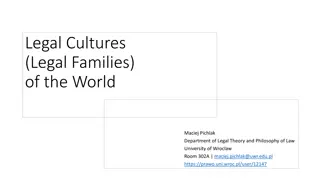HEALTH LAW II
The doctor-patient relationship is a pivotal aspect of healthcare, influencing outcomes and legal obligations. Explore topics like mental health law, professional ethics, and different relationship types in this insightful discourse.
Download Presentation

Please find below an Image/Link to download the presentation.
The content on the website is provided AS IS for your information and personal use only. It may not be sold, licensed, or shared on other websites without obtaining consent from the author.If you encounter any issues during the download, it is possible that the publisher has removed the file from their server.
You are allowed to download the files provided on this website for personal or commercial use, subject to the condition that they are used lawfully. All files are the property of their respective owners.
The content on the website is provided AS IS for your information and personal use only. It may not be sold, licensed, or shared on other websites without obtaining consent from the author.
E N D
Presentation Transcript
HEALTH LAW II Ifeoluwayimika Bamidele, PhD
TWO MAJOR TOPICS DOCTOR PATIENT RELATIONSHIP MENTAL HEALTH LAW Types Types Mental Health Law in Nigeria The mental health bill in Nigeria The Lunacy Act Comparative analysis with other jurisdictions Paternalism Paternalism Mutuality Mutuality Consumerist approach Consumerist approach Patient Patient centred centred Importance to Law Importance to Law Professional ethics and discipline Professional ethics and discipline Personal conduct and professional Personal conduct and professional discipline discipline
DOCTOR PATEINT RELATIONSHIP The doctor patient relationship is an important element of care. It is one of the core elements in the ethical principles of medicine and health care. It promotes the outcome that is desired by the patient and prevents outcomes that are not desired like medical malpractice litigation.
The doctor-patient relationship is "the legal predicate to the recognition of a professional duty of care owed to a patient . DOCTOR PATIENT RELATIONSHIP This forms the basis of a legal duty and relationship between the doctor and the patient.
DOCTOR PATIENT RELATIONSHIP CODE OF MEDICAL ETHICS. MEDICAL AND DENTAL PRACTITIONERS ACT. ETHICAL GUIDELINES OF PROFESSIONAL ETHICAL BODIES DECISIONS OF PROFESSIONAL REGULATORY BODIES CASE LAW
TYPES OF DOCTOR PATIENT RELATIONSHIP PATIENT CENTRED DOCTOR CENTRED "an asymmetrical relationship in which the doctor occupies the dominant position by virtue of his or her specialist knowledge and the patient merely cooperates - Pearsons
ASSESSING THE TYPES OF DOCTOR PATIENT RELATIONSHIP Paternalism Paternalism Mutuality Mutuality Consumerist approach Consumerist approach
DOCTOR PATIENT RELATIONSHIP The doctor-patient relationship means many things or all, to both the patients and their doctors from the waiting room to: Consultation, diagnosis, treatments and compliance/adherence, improved patient and physician satisfaction, better patient compliance, improved health outcomes, better-informed medical decisions, reduced costs of care and reduced malpractice suits/litigations when it go sour.
Doctor patient relationship Moral Dilemmas Ethical issues Interface between Moral, Ethical and Legal Problems in Modern Medicine
FOCUS ON PERSONAL CONDUCT V PROFESSIONAL DISCLIPINE
Driving offences Dishonesty outside clinical practice DOCTOR- PATIENT RELATIONSHIP Relationship/affairs with patients Pre-qualification misconduct Other Character related misconduct
DRIVING OFFENCES: DR CRABBIE . The case of Crabbie v General Medical Council is one of the leading cases in driving offences and professional discipline by the GMC. Dr Crabbie was convicted of causing death by dangerous driving and excess alcohol. She however requested that her case be referred to the GMC s health committee, the Privy Council held that it was a right decision to hear her case before the Professional Conduct Committee since that was the only body that could order an erasure and it was convinced that an erasure from the medical register was the only right decision to make.
DRIVING OFFENCES: DR CRABBIE The defence of the Professional Conduct Committee was that she was already showing features of alcohol dependency and had already brought the profession into disrepute by her actions; it claimed that its decision was justified and proportionate to the offence.
SEXUAL RELATIONSHIPS: NWABUEZE V GMC In Nwabueze v GMC, the doctor had sexual intercourse at his surgery with an ex-patient and other allegations of sexual misconduct with staff which and formed about six of the grounds of the allegation that led to his erasure. In addition to these allegations, he also faced other allegations of dishonesty, on his allegations, the court held per Lord Hope of Craighead, that the professional relationship that existed between the patient and the doctor had elapsed and allowed the appeal in part.
NWABUEZE V GMC At the panel, the doctor s action was said to be a flagrant abuse of trust considering one of the persons involved was a vulnerable patient and another was a member of staff, the Chairman of the Panel therefore considering this abuse of trust as well as dishonesty and announced an erasure which was quashed and returned to the panel based on circumstances surrounding the legal assessor s advice.
NWABUEZE V GMC The focal point of this case was the multiple allegations of sexual impropriety brought against this doctor and the discipline meted out to him. It is considerable that if the allegations brought against him were founded justly, his argument that his sexual activity did not have an impact on his clinical competence can be queried. A patient might indeed be unwilling to continue treatment if they have been harassed by their doctor, however it is difficult to draw the dividing line between mutual and consensual sexual activity between mature adults and coercion based on the use of professional position Nwabueze v GMC [2002] 1 W.L.R 1760
Dr Oluwaseyi Farombi Dr Oluwaseyi, who appeared before the Fitness to Practise Panel in 2011, shows how difficult it is to overlook pre-qualification misconduct, the doctor had been convicted for fraud, had forged a Nigerian passport, forged references and included places and positions he had not worked at on his CV. He also submitted a fake National Insurance Number and also claimed while filling his employment forms that he had never been convicted. Dr Oluwaseyi Olorundamola Farombi, Sept-Dec 2011, FTPP http://www.gmc-uk.org/static/documents/content/Farombi.pdf
Akpata v GMC [2007] EWHC 2713 In Akpata the doctor claimed in his application that he was a member of the Royal College of Obstetrics and Gynaecology and had also been convicted of ten offences of false accounting and dishonesty.
Dr Rumbold was involved in child pornography as he had seventy-seven (77) indecent images of children at his home and confessed to having viewed between up to 200 images. The GMC suspended him and further extended his suspension after its initial expiration on the basis of lack of sufficient understanding of the seriousness of the offence Rumbold v GMC [2007] EWHC 2569 (Admin) Rumbold v GMC
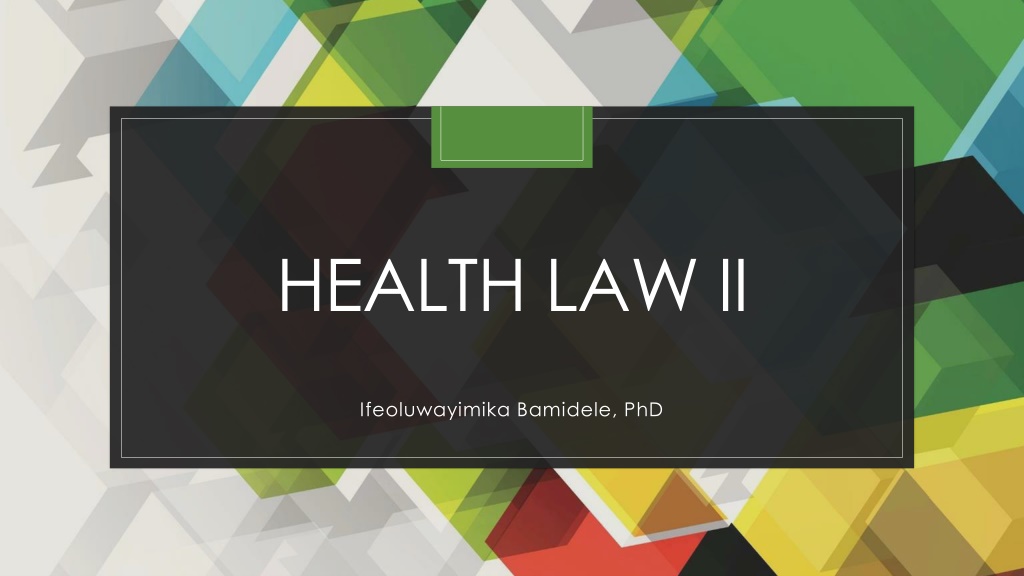
 undefined
undefined























